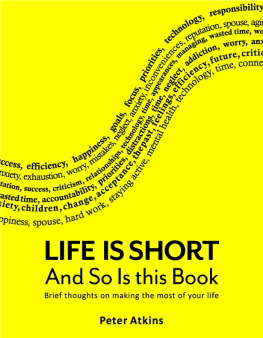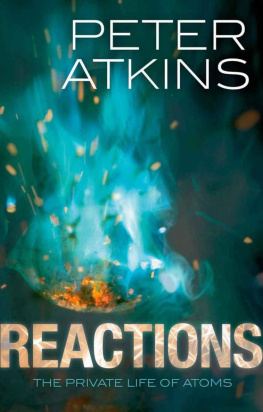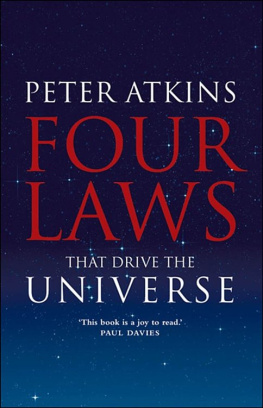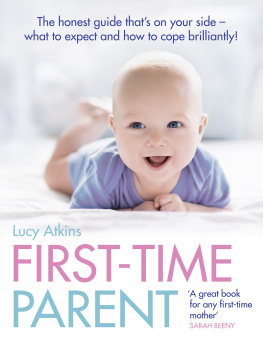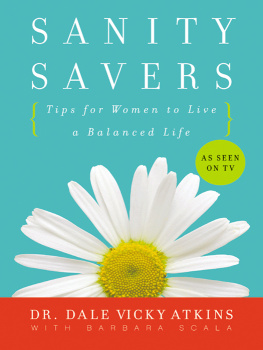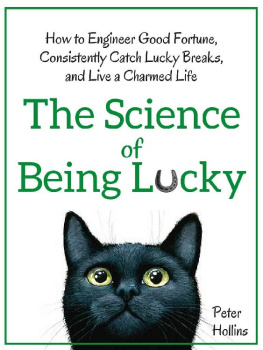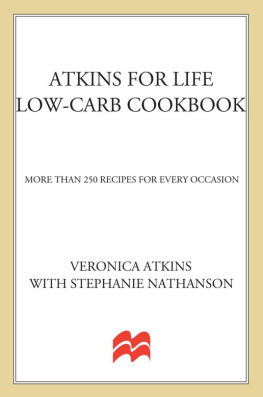
Copyright 2011 by Peter Atkins. All rights reserved.
To Sam and Lillie - who have made my short life wonderful.
introduction
Life is short. You can, if you work hard and are lucky, get more of almost anything, but you cant get more time. Time only goes one way. The average American has a lifespan of less than 30,000 days. So how you choose to live matters.
Thats the topic of this book. I dont pretend to have all the answers. Im still learning every day, and many of the good ideas here Ive picked up from other people either directly or by reading. But this is whats worked for me.
Like life, this book is short. Many books I read could communicate their ideas in fewer pages. So Ive tried to be brief in line with the wise person who noted: If Id had more time I would have written a shorter letter .
I dont think brevity implies lack of content. The concepts here have improved the quality of my life, and I hope theyre useful to you as well.
Using these concepts, I have created a life I love. My job doesnt feel like work. I love and respect the people with whom I spend time. And Im also passionate about my life outside work. Ive learned how to create a balance that makes me happy between work and other interests, including my family, friends and exercise. Sadly I think thats rare. And yet, while I know Im lucky, most people can work towards those goals in their own lives.
My interest in making the most of my life began when I was just starting college, but when I was in my mid-thirties a boss I admired died of cancer. He was young. He had a great wife; he had three young children; he had a fantastic career -- he had everything in life. He just didnt have enough time. So, while Id often thought about how to get the most out of life, the death of someone so young and vital increased my sense of urgency to act on it.
One of the things Ive always wanted to do was to work for myself. As a result, I left an exciting job at Microsoft in 2001 amidst the Internet bust to found the investing firm I now run. It was hard to do, both financially and emotionally. When I left Microsoft, many people friends, family, and even some of the press - thought I was deluding myself to start a fund focused on Internet-related companies during a market crash. A press quote from the time said: Call him a little crazy. Call him a little nuts . Id never seen that type of coverage before. And, in a sense, the press was right; the business wasnt easy to start. Fortunately, from a vantage point of ten years down the road, its worked out quite well.
A key part of my job is reading and thinking about a broad variety of topics. So writing this book was relatively easy. Its even easier to read. But, like many things in life, actually executing each day on these concepts is extremely difficult. With thanks to Thomas Edison, life is 1% inspiration and 99% perspiration. Even so, I hope you have fun perspiring.
Peter Atkins
Seattle, WA
December, 2010
CONTENTS
1. Create space.
2. Try not to worry.
3. Don't do really dumb things.
4. Build character and make friends.
5. Care for yourself and others.
6. Laugh.
7. Do what you love.
8. Embrace change.
9. Learn from experience.
10. Have dreams and work towards them.
11. Epilogue.
12. Afterword - the world beyond us.
13. Acknowledgements.
create space
Life moves pretty fast. If you dont stop to look around once in a while you could miss it.
- From the movie, Ferris Buellers Day Off
We all approach life in different ways. Some ways allow more time to think, to be creative, to do whats important, and to spend time with friends. Ill give you an example.
A friend of mine used to be the CEO of a well-known Internet company. He once told me he found it funny that the busiest people on his team were always the people to whom he could give more work, while the ones who accomplished less had little time for anything (often including their existing responsibilities).
Ive found this is an important observation. Its often the most successful people I know who are most efficient with their time and who always seem to have time to think and to do more. The trick is people who are most productive tend to say no to things that are unimportant to them and focus on what they believe matters. When you think about it, how could it be any other way?
Of course, activity by itself doesnt equal accomplishment, and certainly not success -- being busy just means being busy. I know many people who work super hard to fill up the spaces in their lives, so they wont have to think. A wise colleague calls this numbing out. They may accomplish their goals, but theyre unlikely to be fulfilled or do truly creative work. I know other people who fill their free time with meaningless activities. Theyre also busy, but they neither achieve much, nor are they satisfied.
In contrast, I once had a smart boss who told me if I wanted to do my best work, I needed to do fewer things, and really focus on what mattered. That was great advice. Many people confuse want to with have to . In other words, just because someone else wants you to do something doesnt mean you have to do it. You cant get more time, so how you spend the time you have is critical. Focusing on what matters means saying no to things that dont matter. Otherwise, your life becomes cluttered with distractions.
Technology presents both potential distractions and also great opportunities to use your time better. Technology is a tool. Used properly, it can help you but, like any other tool, it can be mismanaged. If, for example, you spend most of your day responding to email, or text messages, or checking out your friends on social networks, you wont get much done.
A better approach is to decide what you want to do and what is most important. Make lists. Then use technology to assist you, versus allowing it to control you. To execute on this concept requires discipline and practice, but anyone can get better at it, and make real progress if they want to.
One way I like to use technology to save time is, where appropriate, to eliminate meetings and use email instead. I should emphasize where appropriate. Email does a terrible job of conveying subtle emotional content, so meetings are more appropriate for team building, for negotiating, for personal conversations, and for any other situation where its important to look someone in the eye. But for some things, email is better.
Mobile devices provide a fantastic way to stay connected and on top of work, wherever you may be. If you have any down time, you can read books or articles, check email, or browse the web from virtually anywhere.
Distractions have increased for reasons beyond new technologies. According to the Bureau of Labor Statistics, about 60% of U.S. families are two-income households, compared with only about one-third in the mid 60s (the statistics are directionally similar in much of the Western world). Were busier and, consequently, are tempted to do lots of things at once.
A number of people I know claim to be great multi-taskers. The brain, however, doesnt work that way; instead it focuses on one activity at a time. If you switch back and forth between multiple tasks, your brain works more slowly than it would if you focused on each activity for a period of time. Albert Einstein said: It's not that I'm so smart, it's just that I stay with problems longer. Most of us do the opposite -- with predictable results.

